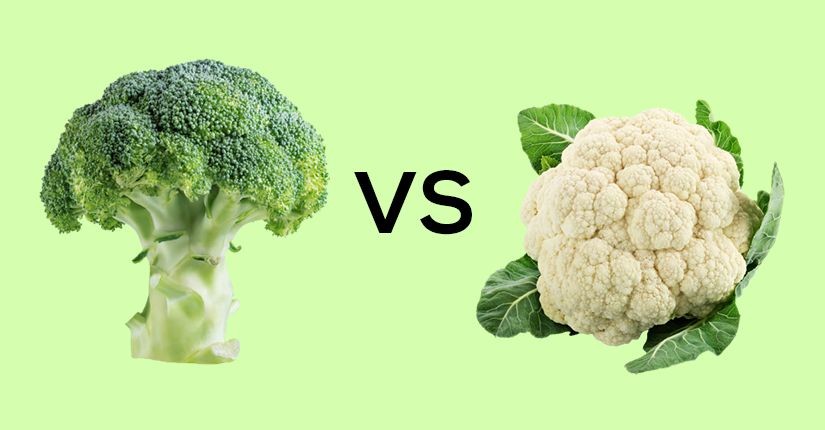
Contents
Broccoli vs. Cauliflower: Health Benefits
Both cauliflower and broccoli are widely consumed cruciferous vegetables. They are nutritious, satiating, and low-calorie foods.
Both broccoli and cauliflower are excellent dietary options. Broccoli is rich in lutein, which is good for eye health. They are low in calories and provide various nutrients including protein, minerals, and vitamins. They are also rich in fiber, promoting overall health.
Broccoli has a higher concentration of some nutrients, such as protein, calcium, iron, and some vitamins, but you don’t have to replace cauliflower with broccoli in your diet.
A diet that includes lean protein, dairy, fruits, and vegetables fulfills most of your nutritional needs. So, you can include either or both of these vegetables in your diet. You can choose based on the availability and cost in your area. Broccoli tends to be more expensive than cauliflower.
Broccoli vs. cauliflower nutrition chart
| 101 grams | 81.3 grams |
| 27.5 kcal | 30.9 kcal |
| 5.47 grams | 6.04 grams |
| 2.1 grams | 1.55 grams |
| 2.2 grams | 2.37 grams |
| 2.11 grams | 2.57 grams |
| 0.31 grams | 0.34 grams |
| 24.2 mg | 42.8 mg |
| 0.46 mg | 0.66 mg |
| 16.5 mg | 19.1 mg |
| 48.4 mg | 60.1 mg |
| 0.30 mg | 0.37 mg |
| 0.66 µg | 2.28 µg |
| 33 mg | 30 mg |
| 329 mg | 288 mg |
| 0.05 mg | 0.06 mg |
| 0.06 mg | 0.11 mg |
| 0.56 mg | 0.58 mg |
| 0.20 mg | 0.16 mg |
| 62.7 µg | 57.3 µg |
| 48.7 mg | 17 mg |
| 0 | 0 |
| 0 | 28.2 µg |
| 17 µg | 92.8 µg |
| 0.08 mg | 0.71 mg |
| 1.1 µg | 1270 µg |
| 53 mg | 81.2 mg |
QUESTION
What are cruciferous vegetables?
Cruciferous vegetables belong to the mustard family (Brassicaceae) and have flowers arranged in a cross shape. They include:
- Cabbage
- Cauliflower
- Broccoli
- Kale
- Brussels sprouts
- Turnip
- Napa cabbage
- Kohlrabi
- Horseradish
- White mustard
- Radish
- Wasabi
How can I include cauliflower and broccoli in my diet?
Cauliflower and broccoli are versatile vegetables that can be included in various recipes. They can be prepared according to personal taste by adding preferred condiments and spices.
Some suggestions for consuming these vegetables include:
- Cauliflower rice
- Broccoli soup
- Baked cauliflower or broccoli
- Steamed and added to salads
- Marinated with low-fat yogurt and spices, then grilled for delicious starters or side dishes
- Using finely grated cauliflower as a pizza base instead of flour
- Sautéed with other vegetables
- Stuffed in sandwiches
- Steamed and seasoned for a snack with yogurt dip or hummus
- Added to pasta, rice, or quinoa for bulk and nutrition
8 health benefits of cauliflower and broccoli
Both cauliflower and broccoli are considered superfoods. Their health benefits include:
- Good for cardiovascular health: Both vegetables improve heart health and blood pressure. They regulate blood pressure, lower cholesterol levels, and reduce the risk of heart diseases and stroke.
- Keep gut healthy: Both vegetables are rich in fiber, promoting healthy bowel movements and the growth of beneficial gut bacteria. This reduces the risk of gut issues like constipation and indigestion.
- Improve immunity: Broccoli and cauliflower strengthen the immune system, lowering the risk of infections. Vitamin C in these vegetables is particularly beneficial for immune response.
- Promote healthy vision: Vitamin A, lutein, zeaxanthin, and selenium in these vegetables promote eye health by protecting against free radicals.
- Improve bone and muscle health: Calcium, vitamin K, magnesium, and phosphorous in cauliflower and broccoli are essential for strong bones, teeth, and muscles.
- Help manage weight: Being low in calories, they are preferable for weight watchers. Their high fiber content promotes satiety, preventing overeating.
- Promote brain health: Rich in antioxidants and omega-3 fatty acids, these vegetables protect the brain against free radicals and help regulate blood cholesterol and pressure, reducing the risk of stroke.
- May protect against cancer: Carotenoids and glucosinolates in broccoli and cauliflower protect cells from oxidative damage, reducing the risk of various cancers.
Conclusion
Both broccoli and cauliflower are excellent food options for your health. Include them based on your taste preferences, availability, and cost. It’s recommended to include a variety of fruits and vegetables in your diet for optimal nutrition. Variety ensures you stay healthy while enjoying different flavors.


